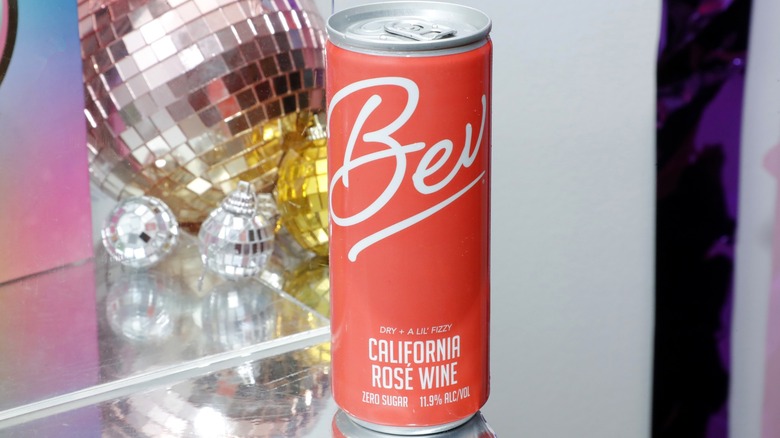Why Canned Wine Gives Off An Awful Smell
We may receive a commission on purchases made from links.
While canned wine doesn't have a reputation for being the best quality vino money can buy, it is sometimes a convenient option when you want it on the go. Adventures in the great outdoors and backyard barbecues are places where you will most frequently spot it, but if a can of wine doesn't cross your gaze, you may well know it is around once you catch a whiff of its distinctive aroma. The sinister stench of rotten eggs is known to permeate an area where canned wine has been opened, and now researchers have discovered the culprit behind this offensive odor.
Canned wine typically contains sulfur dioxide (SO₂) because the chemical has antioxidant and antimicrobial qualities. Essentially, it is there to keep the wine as fresh as possible. However, when SO₂ comes in contact with aluminum, molecular changes occur that produce hydrogen sulfide (H₂S), the source of the stink.
Manufacturers line the insides of the can with a thin plastic coating to prevent the SO₂ from interacting with the aluminum, but it eventually breaks down. Within four to eight months of canning, the off-putting bouquet will start to form. Still, not all wines are the same and some are less likely to give off the scent of rotten eggs when opened.
Some canned wines are less likely to stink
If the stench of sulfur is too much for your senses to bear, you are probably better off purchasing some cheap wine from Trader Joe's and pouring it into a travel-friendly tumbler. You could also try boxed wine, which lasts for weeks after opening and won't produce an unpleasant smell. However, if the convenience of a can is something you don't want to give up, try to find the freshest ones available. The longer canned wine sits on a store shelf, the more likely it is to develop a repulsive scent.
Take a look at the kind of wine you're buying, too. You probably aren't going to find the sweetest variety of wine coming from a can, but if you avoid white and rosé wines, your nostrils are less apt to have a meltdown. Reds aren't as prone to developing the stinky aroma, although they can sometimes be hard to find in canned form. Most folks assume canned wine is cheap wine, so producers don't put spendier reds in cans as often as lighter vintages. Still, it might be worth searching for red varietals of canned wine if you must have a can and also want to avoid being knocked over by the scent of rotten eggs when you crack it open.

